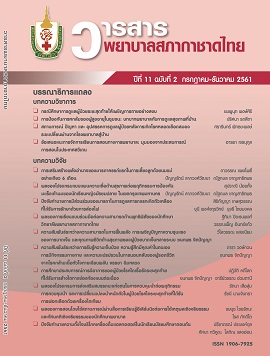Effects of Self-Efficacy Promotion on a Fluid Control Program on the Fluid Control Behaviors and Body Weight Changes in End Stage Renal Disease Patients Undergoing Hemodialysis
Keywords:
self-efficacy promotion on fluid control, fluid control behaviors, body weight changes, hemodialysis, end stage renal diseaseAbstract
This quasi-experimental research with one-group time series design aimed to study the effects of self-efficacy promotion on a fluid control program on fluid control behaviors and body weight changes in end-stage renal disease (ESRD) patients undergoing hemodialysis. Ten ESRD patients undergoing hemodialysis at Pathumthani Hospital underwent purposive sampling. They received self-efficacy promotion on a fluid control program for 4 weeks. A personal and Illness related data record form, fluid control behaviors assessment form and a body weight changes record form were used for data collection. The patients’ fluid control behaviors were assessed before receiving the program and at the 4th and the 8th week after receiving the program. Body weight changes were recorded weekly for 4 weeks before the program and 8 consecutive weeks after the program. Data were analyzed by descriptive statistics and repeated-measure ANOVA.
The results of the study found that after receiving self-efficacy promotion on fluid control program, the patients’ fluid control behaviors significantly increased and body weight changes significantly decreased compared to those prior receiving the program. The self-efficacy promoting program should be further developed for more efficient fluid control. In addition, the fluid control behaviors and body weight changes of the end-stage renal disease patients undergoing hemodialysis should be continually assessed.
References
2. U.S. Renal Data System, USRDS 2017 Annual Data Report: Atlas of Chronic Kidney Disease and End-Stage Renal Disease in the United States, National Institutes of Health, National Institute of Diabetes and Digestive and Kidney Diseases, Bethesda, MD, 2017.
3. Thailand Renal Replacement Therapy Year 2014 [Internet]. 2014 [cited 2016 July 15]. Available from: http://www.nephrothai.org/ind
4. Kookiangboon W. Volume overload management of chronic kidney disease patients [Independent study of Nursing Science Program in Adult Nursing School of Nursing]. Khonkaen: Khonkaen University; 2008. (in Thai)
5. Thussabut N, Siriwatanamethanon J, Buatee S. Model for prevention volume overload of end stage renal disease among hemodialysis patients. Journal of Nurses’ Association of Thailand, North-Eastern division. 2013;31(4):89-96. (in Thai)
6. Phinge C. The relationships among knowledge, health belief and self-care behaviors for volume overload revention in hemodialysis patients. [Independent study]. Chiangmai: Chiangmai University; 2012.
7. ชัยรัตน์ ฉายากุล. ข้อแนะนำเวชปฏิบัติการฟอกไตด้วยเครื่องไตเทียม พ.ศ. 2557. กรุงเทพฯ: โรงพิมพ์เดือนตุลา; 2557. (in Thai)
8. Kamphaengthong P. Lived experiences of patients on hemodialysis in Ratchaburi.
[A Thesis Master of Nursing Science Program in Adult Nursing, School of Nursing]. Nakhonpathom: Christian University; 2005. (in Thai)
9. Aliasgharpour M, Shomail M, Moghaddam MZ, Faghihzadeh S. Effect of self-efficacy promotion training program on the body weight change in patients undergoing hemodialysis. J Ren Care 2012;38(3):155-61.
10. Bayhakki HU. Lived experiences of patients on hemodialysis: A meta-synthesis. Nephrol Nurs J 2012;39(4):295-304.
11. Valsara BP, Bhat SM, Prabhu R, Dinesh NA. Qualitative research on the experience of hemodialysis in South Karnataka: Lived experience of persons undergoing hemodialysis. JKIMSU 2014;3(2):90-100.
12. Pramanee K, Keeratiyutawong P, Duangpaeng S. Factors influencing fluid control behavior in end stage renal disease patients receiving hemodialysis. Rajangarindra Graduate School Journal 2014:303-06. (in Thai)
13. Arammuang S, Sangkard K, Kimpee S, Sriyuktasuth A. Factors predicting fluid control behavior in chronic kidney disease patients receiving hemodialysis. Journal of Nursing Science 2012;30(3):74-81. (in Thai)
14. John A. The relationship between self-efficacy and fluid and dietary compliance in
hemodialysis patients. [Doctoral dissertation research]. Las Vegas: University of Nevada; 2012.
15. Lindberg M, Fernandes MAM. Self-efficacy in relation to limited fluid intake amongst Portuguese hemodialysis patients. J Ren Care 2010;36:133-8.
16. Bandura A. Self-efficacy: The exercise of control. Stanford University. New York: W.H. Freeman; 1997.
17. Tsay SL. Self-efficacy training for patients with end-stage renal disease. J Adv Nurs 2003; 43(4):370-5.
18. Dell RB, Holleran S, Ramakrishnan R. Sample size determination. ILAR J 2002;43(4):207-13.
Downloads
Published
Issue
Section
License
เนื้อหาบทความหรือข้อคิดเห็นต่างๆ ในวารสารพยาบาลสภากาชาดไทยนี้ เป็นความคิดเห็นของผู้เขียนบทความ ไม่ใช่ความเห็นของกองบรรณาธิการ หรือสถาบันการพยาบาลศรีสวรินทิรา สภากาชาดไทย





